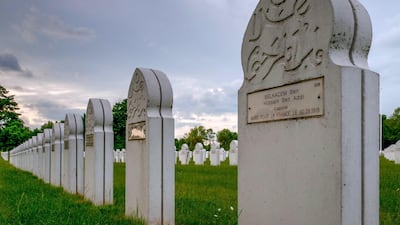In the trenches of the First World War, 1.5 million Indian soldiers found themselves fighting on behalf of their British colonial masters. They wrote letters home describing the racist treatment they received from those whom they were fighting for. And they talked of their aspirations for the kind of freedom they fought for on behalf of others but which they themselves were not privilege to have. As subjects of the empire, they were conflicted. It would be another three decades before that paradox was resolved and the Indian subcontinent gained independence.
A century on from the end of the First World War, a new generation of Britons who can trace their roots to somewhere else – myself included – have inherited this conflicted sense of "we". There are many of us who either bore the scars of colonisation or witnessed them, while simultaneously enjoying the perks of living as part of a society built by a former colonising power.
How do the descendants of those impacted by the British empire, like me, who now live in Britain but whose forebears were the subject of colonial rule and slavery, deal with the position we find ourselves in? When I talk about being British – particularly in a post-Brexit era, a debate which has been defined by the idea of "us" and "them" – in that context, am I part of "we" or "them"? Am I reconciled to benefiting from Britain's imperial past or should I distance myself from it? Does wanting to contribute to British society and reap the rewards of doing so on an equal footing make us "colonial flunkeys"?
This sense of conflict grows stronger as there are now second and third generations of immigrants who have been born and brought up in Britain, who know nothing other than being British, and whose only experience of home and identity are restricted to these shores. When the far right tells us to “go home”, it makes no sense; we are already home.
Black historian David Olusoga articulated this conflict when he was invited to accept an Order of the British Empire (OBE), an honour conferred by Queen Elizabeth II. It led, he said, to a “crisis of soul-searching”. A number of people from different backgrounds have rejected an OBE in the past, among them David Bowie, Nigella Lawson and JG Ballard; critics say it is an outdated concept born of a “preposterous” notion of empire which no longer exists. Other high-profile black figures, among them playwright Kwame Kwei-Armah and the singer Ms Dynamite, said they were accepting an OBE in recognition of the sacrifices made by the Windrush generation.
Olusoga, who has done great work in bringing to life the story of Britain’s slave trade, eventually decided to accept his honour as a means to counter racism, writing in the Guardian: “Every time a black expert appears on TV with a title…or with letters such as OBE after their name, a tiny breach is made in the wall of racism”.
Others have taken a different position. The black poet Benjamin Zephaniah, for example, rejected an OBE in 2003, saying while racism and police brutality still existed, the end of slavery and colonisation was not reason enough to accept it.
That is why stories such as that of the Indian soldiers who fought for the protection of a nation which was not their birthplace are so important in shedding light on the story of Britain, who contributed to it and how we got here. But the conflict we face, as the descendants of those who were colonised and who now benefit from the wealth and opportunity built on the backs of our ancestors, while feeling compelled to make the country in which we claim a stake a better place, is a very different one.
It is the collision of history and present experience that burns existentially within us. As the descendants of those whose right it is to have recognition, apology and recompense, we are now in the position of being part of the very system that gives it. Yet the hierarchies and racial divisions that propped up the empire, from racism and discrimination to a lack of opportunity, still exist in Britain today.
What, then, do we mean by “we” when we talk of being British? We must be aware of the paradox of our plight and that confronting these conflicting emotions is healthy, if fraught. And we must never stop breaking down barriers put up by those who would deny us the right to use the word “we” in the first place.
Shelina Janmohamed is the author of Love in a Headscarf and Generation M: Young Muslims Changing the World


